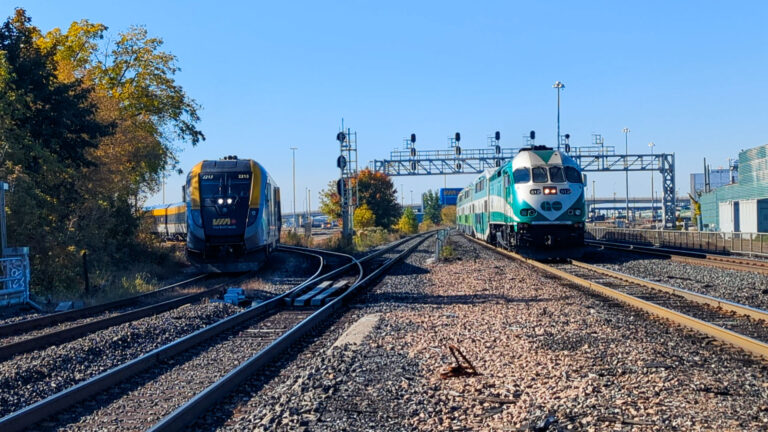I’ve tried several different ways to lay track, but I haven’t found any technique that is as slick as using latex caulking as an adhesive. The technique is very simple; smooth a small bead of caulking onto the roadbed; pin the track in place; done! The major advantage of this method is the caulking holds everything in place. Caulking is not sticky, but quite tacky, and once the track is set it almost needs no pinning. If you don’t like where the track has been set, pull it up effortlessly, and reposition it. If too much caulking gets on the rails, you can wash it off with water. Caulking is also an effective glue with good adhesion, and once dry becomes waterproof ‘ so you needn’t worry about your track springing free while soaking your ballast in watered-down glue.
It’s important to use transparent latex caulking ‘ as opposed to the standard white. Some of the caulking will inevitably work its way up between the ties, and the transparent caulking will be virtually invisible, whereas the white caulking will either need to be carved away or painted. On a previous layout, it wasn’t until I started ballasting that I noticed the while caulking peeking through the ties, and it was a real headache to remove!
N Scale Track at 1/32
In 1 Scale, 9mm track has a rail spacing of about 1 scale foot. The ties are 2x3s with an average spacing of about 6 inches. I wanted the ties to be spaced about 12 inches apart, so I chose to remove every-other tie. This was a disaster.
Using my rail nippers, I snipped between each tie, removing every second tie as I went. Once the ties were removed the tracks seemed a little flimsy; the ties freely slid back and forth, and the rails and were quite loose. I figured that once set into the caulking everything would be fine, so I soldered the first section of track to the turnout, bent it around the curve, and disaster struck! The entire length of rail twisted, and all the ties flew off in every direction. I attempted to snap the ties back on, but each of the little spike heads had been broken off.
I removed the twisted rails (they will make lovely scale scrap) and replaced them with another section of track ‘ ties intact. The sharp curves and steep grades put a good deal of stress on the track but with enough pins everything held in place. I noticed another advantage of the caulking was that it still offered good adhesion in those places where the ties didn’t quite touch the baseboard.
Some areas of the track only needed an hour before they had completely dried. I took the rail nippers and removed a few ties to ensure that I could achieve the tie spacing I wanted earlier. Success!
I spent the next 10 minutes sweeping up all of the track shrapnel on the floor!

































